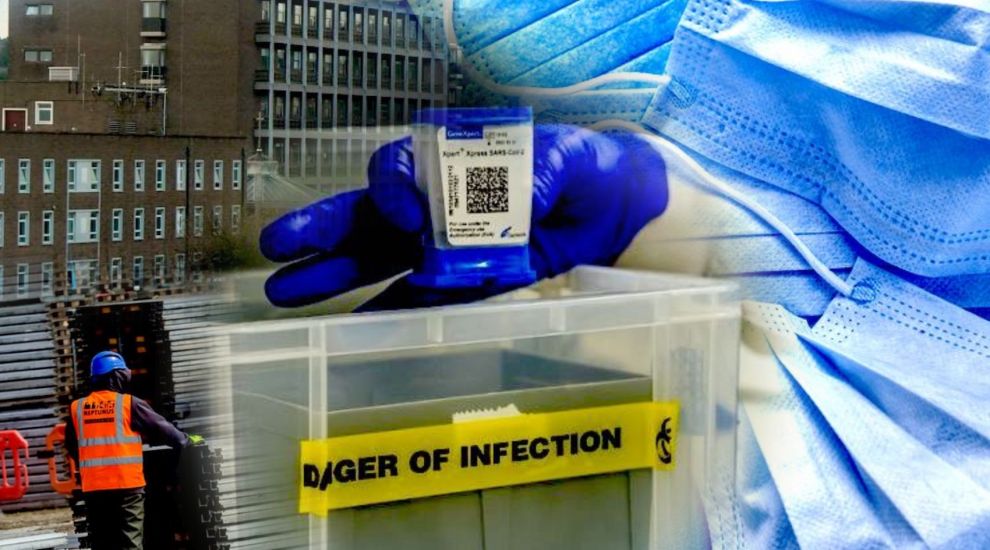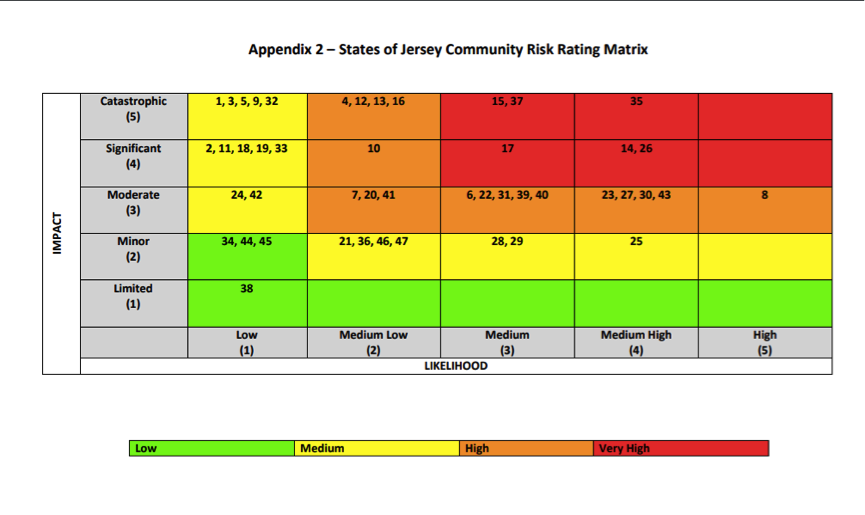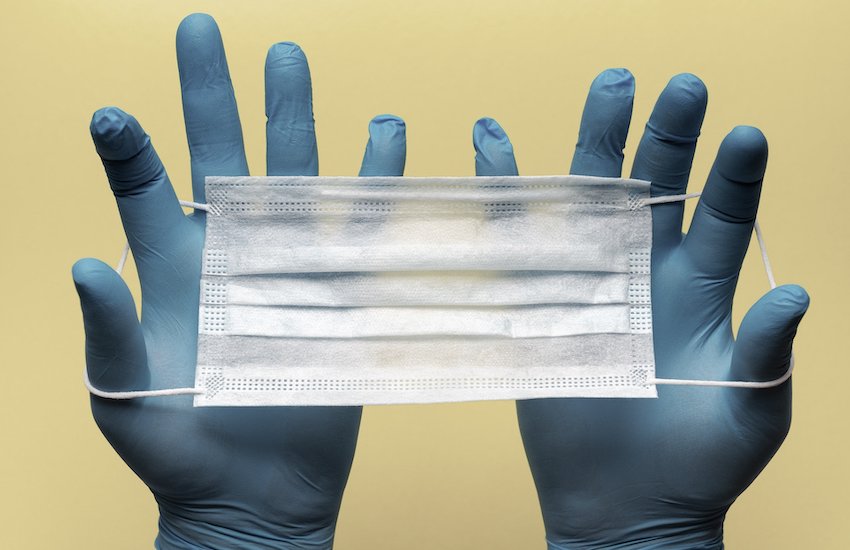


Moves to finally update Jersey’s six-year-old plan for handling a pandemic had to be put on hold...due to the global covid-19 pandemic, Express has learned.
The last published pan-island plan dates back to 2014, and is based on the UK’s 2011 ‘Influenza Pandemic Preparedness Strategy’ developed in the wake of bird flu and swine flu sweeping throughout the globe.
Despite a pandemic being dubbed the greatest threat to island life – ahead of a major pollution incident, a collision between commercial vehicles and the sinking of a passenger ship – by government, it wasn’t until November 2019 that a new version of the plan was tested out.
The ‘table-top’ test exercise involved the NHS’ Lead for Pandemic Influenza and its Emergency Preparedness Manager.

Pictured: Work was never finished on the updated Pandemic Plan.
A report containing suggested improvements was prepared following the exercise, and the Jersey Resilience Forum also put forward a number of suggested updates to the plan.
However, that work was never finished.
“An updated draft has been prepared, but is not yet complete,” a government spokesperson confirmed to Express.
“Work to make amendments agreed by the Jersey Resilience Forum in February ceased when covid-19 reached Jersey.
“Any lessons learned from covid-19 will now need to be incorporated into the strategy, and once it is completed it will be signed off by all those who have contributed to it.”
The admission means that the government has been dealing with the covid-19 pandemic without a full plan, with the latest version six years out of date.
Express requested the draft version of the pandemic plan, as well as a copy of the recommendations arising from the emergency exercise.
Both requests were denied, with the latter described as an “internal document."
Officials also refused to release the latest version of another key document: the Community Risk Register.
The report gives a list of all the major disasters that could hit the island community, ranking them in terms of likelihood and catastrophic nature - ranging from flooding to pollution and fire at the hospital – and a basic roadmap of how to mitigate them.
In the latest published version, which dates back to 2014, a pandemic was the most likely catastrophic event, labelled a “very high (red) risk”.

Pictured: A pandemic is number 35 on the Community Risk Register - the most likely catastrophic event.
This type of risk, the document says, is described as a “major risk requiring immediate attention”, and requires specific “rather than generic planning”.
“They may have a high or low likelihood or occurrence, but their potential consequences are such that they must be treated as a high priority. This may mean that ways should be developed to reduce or eliminate the risk where possible and also that mitigation (in the form of multi-agency planning and training for these hazards) should be put in place and the risk monitored regularly,” the document said.
Officials refused to provide the 2019 version of the Community Risk Register they’re currently working from, on the basis that it contains “commercially sensitive information and assessments of national security."
They added that, unlike UK councils, which keep a version of the document in the public domain, they had decided to no longer produce one, “due to limited public interest."
A spokesperson added that, “in addition to the Community Risk Register, the Government has a Corporate Risk Register, which considers a range of operational risks the Government faces. This is reviewed on a quarterly basis by the Executive Leadership Team and forms part of an overall suite of performance information regularly considered by Government.”
However, a pandemic was not listed as one of the key corporate risks in the Government Plan put together by the Council of Ministers, which listed these as instead being related to cyber security, Brexit, failure to implement OneGov modernisation, and changes to the Health Department and Children’s Services.
Pictured: Neither the Government Plan, nor any of the Departmental Business Plans, listed a pandemic as a key corporate risk.
No single department mentioned a pandemic in their corporate business plans for 2020, including the Health Department and Office of the Chief Executive.
As islanders aren’t being given access to the latest plans, Express took a look at the key areas of the last publicly available version.
(Note: This is NOT the current strategy.)
The risk of a pandemic is characterised as high – both in terms of its impact on the island and likelihood. The issue, however, is that no one knows when it’s going to strike.
“The interval between influenza pandemics is variable, ranging from 11 to 39 years during the last century. There are no known markers that herald the start of a new pandemic.”
It’s also suggested that Jersey could be at a higher risk due to being a small island, noting that a virus could sweep through the island in as little four weeks, with potentially devastating effects, while the UK might be able to spread it over four months.
Both documents detail the importance of preparations for a pandemic being part of regular risk planning.
The 2014 pandemic strategy says: “Given the lack of relevant information, assessments of impact on a countries economy are necessarily simplistic and can only be illustrative.
“One such illustration would be to assume illness-related absence from work of 50 per cent of employees over the course of the pandemic and an average absence from work duration of 1.5 weeks per person with consequent loss to our economies. This loss could be mitigated through effective business continuity planning.”
The Fiscal Policy Panel have projected a sharp dip in the local economy as a result of the present pandemic, while Assistant Treasury Minister Senator Ian Gorst yesterday said that the government could be looking at borrowing as much as £500m to plug gaps in lost revenue to keep the island afloat.
“Health services should continue to prepare for up to 30% of symptomatic patients requiring assessment and treatment by primary care, assuming the majority of symptomatic cases do not require direct assistance from healthcare professionals.
“Between 1% and 4% of symptomatic patients will require hospital care, depending on how severe the illness caused by the virus is. There is likely to be increased demand for intensive care services.”
At present, there are 14 islanders using hospital beds due to covid-19, with more than 100 free, and a 180-bed field hospital is in the process of being constructed.
“The combination of particularly high attack rates and a severe disease is also relatively (but unquantifiably) improbable. Taking account of this, and the practicality of different levels of response, when planning for excess deaths, local planners should prepare to extend capacity on a precautionary but reasonably practicable basis, and aim to cope with a population mortality rate of around 1,250 people in Jersey possibly over as little as a four-week period.
“In a lower impact influenza pandemic, the number of additional deaths would be lower.”
As of today, there have been 18 deaths in Jersey and a new temporary mortuary space has been opened in Bellozanne Valley to cope with any additional deaths.
The Community Risk Register says that, in order to be ready for a pandemic, the government should: “Talk to suppliers to determine resilience in accessing increased supplies of specific items in event of a pandemic; consider 5% uplift in normal hospital stock levels; and ensure arrangements for accessing increased supplies of antibiotics and PPE (PPE to be used by healthcare professionals in event of a pandemic when caring for affected patients).”
Jersey used to have a dedicated supply of PPE for use in the event of a pandemic. However, the Health Minister admitted this week that this was axed a decade ago and merged with existing extra stocks.
Around £5million has been spent on PPE items – much of which coming through the NHS supply chain - by the government, which recently created an online hub for all health providers to access, while a significant shipment arrived on the island this week.
Facemasks and respirators – a more sophisticated version designed to protect the wearer from breathing in fine and small airborne particles – are recommended for health workers.
However, for the public, it notes: “Although there is a perception that the wearing of facemasks by the public in the community and household setting may be beneficial, there is in fact very little evidence of widespread benefit from their use in this setting.”

Pictured: The document says that medical face masks should specifically be stockpiled for health workers.
Health and frontline workers are currently being provided with face masks, but the public has been asked to make use of cloth face coverings instead.
The pandemic strategy adds: “Jersey and Guernsey should maintain small stockpiles of facemasks and respirators for health and social care workers. In line with the scientific evidence, we will not stockpile facemasks for general use in the community.”
The construction of a field hospital is not specifically mentioned in the strategy.
Where possible, the strategy document urges the Channel Islands to enter into pre-purchase agreements to ensure that each island can get their hands on a supply of vaccines and anti-viral treatments as soon as they are developed.
It says that this was crucial in Jersey’s approach to tackling H1N1, which saw 12,500 children immunised in schools, nurseries and parish halls within six days.
The move received such praise by European infectious disease experts that the island was invited to present at an international conference in The Hague.
There is currently no vaccine or medication available to treat covid-19, but UK Health Secretary Matt Hancock said this week that a vaccine was currently being developed in Oxford.
The Chief Minister told Express this week that the government has not yet made any pre-purchase agreements with developers, but said that Jersey should be able to expect a slice of any UK supply.
He said: “The difficulty is that we’re in very very early days and I don’t think anyone to date is anywhere close to something that we can say, ‘Yes, we’d like to come and talk to you.’
“What I can say is that at a political level, we’ve been in discussions with the Ministry of Justice, for example, and we have… a joint meeting with the other two Crown Dependencies. We are for the purposes of this all regarded as part of the same British Isles family so the expectation from that conversation… When a vaccine is developed and the UK as a whole put their order in, the expectation is that we would be part of that ordering process. Based on the assurances we’ve had to date, we’ve got no reason to doubt that whatsoever, but obviously we know we’re in early days.”
Video: The Chief Minister told Express that the Ministry of Justice had provided assurances that Jersey would be able to access some of the UK's vaccine stock.
On medication, he added: “There have been some other references to certain other drugs which have been referred to as having some impact in treating the disease and we do have some stocks of those on-island because they’re already in use for things like rheumatoid arthritis treatments.”
This is not specifically mentioned in the strategy, but the government is aiming to roll out a programme of testing to find out which islanders have had the illness.
Kits received from Healgen are currently being tested for their accuracy.
The document emphasises that good hand hygiene is one of the best ways to avoid the spread, and urges a 'catch it, bin it, kill it campaign'.
It also suggests the establishment of a virus information helpline.
The government carried out both of these.
School and business closures - both of which have now occurred - are listed as a risk in the event of a high-impact pandemic, with a warning that the latter could carry a risk of supply difficulties.
The document explains that the island should monitor intelligence from both WHO and Public Health England in its response to pandemics.
However, concerns have since been expressed about the island too closely following the UK's response, particularly in the wake of a Sunday Times investigation published last week, which suggested that the UK had been slow to react to the crisis, with the Prime Minister missing several COBRA meetings and failing to secure key health supplies rapidly to which the UK government issued a detailed rebuttal.
On Twitter, Deputy Kirsten Morel shared fears that any poor planning on the UK's part could have a "knock-on effect for Jersey".
I'm no fan of Owen Jones but this is a very important thread.
— Kirsten Morel (@KirstenJersey) April 18, 2020
The UK govt failed to prepare for CV19. Poor stocks of PPE and poor testing capability & bad advice. Sadly, I think this had a knock on effect for Jersey. https://t.co/cPB3yZGV3W
Comments
Comments on this story express the views of the commentator only, not Bailiwick Publishing. We are unable to guarantee the accuracy of any of those comments.